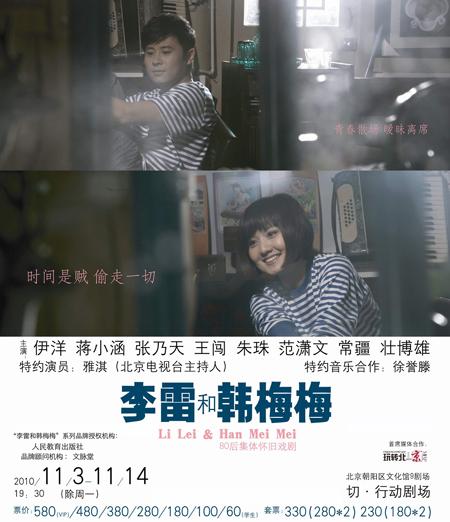 A poster of Li Lei and Han Meimei, a nostalgic drama, on show during a recent news conference in Beijing. They were characters in a book schools used to teach English to the Chinese post-80s generation. Images of Li and Han brought back nostalgic memories for those many regard as spoiled little "princes" and "princesses" growing up during China's opening up policy.[Photo/China Daily]
A poster of Li Lei and Han Meimei, a nostalgic drama, on show during a recent news conference in Beijing. They were characters in a book schools used to teach English to the Chinese post-80s generation. Images of Li and Han brought back nostalgic memories for those many regard as spoiled little "princes" and "princesses" growing up during China's opening up policy.[Photo/China Daily]
BEIJING - A chipper girl in a bobbed hair style said on the first day of her middle school life: "Hello, my name is Han Meimei. What's your name?" A plain-dressed shy boy answered in a low voice: "Li Lei."
It was the first English paragraph that the Chinese post-80s generation learnt from their textbooks and brought back many pure and sweet puppy love memories for those who are regarded as spoiled little "princes" and "princesses" growing up with China's opening-up policy and also currently a major force driving consumption in China.
Seeing the value of the so-called Moonlite consumer group with fatter purses and a stronger sense of individualism, marketers have been ingratiating themselves with the fashion-savvy consumers by whatever means they can.
Li Lei and Han Meimei may have merely been fictional characters in the outdated English textbooks, but they have now become a selling point for sharp-nosed business people.
A recent drama featured stories of their grown-up lives which won great box-office success. Hong Kong-based clothing firm Giordano has launched 2,000 limited-edition T-shirts adorned with Li Lei and Han Meimei pictures, creating a stir among the post-80s generation, also known as balinghou.
Eva Song, a 28-year-old marketing manager for a fast food chain company in Beijing, said: "I didn't get a T-shirt because they sold out immediately upon release. They were originally priced less than 200 yuan, but I bought one from a collector for 400 yuan ($61).
"It did warrant the money as it is not just a T-shirt, it is the common memory of the post-80s people," she said. "We, used to being the happiest generation, are suffering from enormous pressure socially and financially. Such lovely items help us to recall the carefree life without the need to find a decent job, buy an apartment, raise a child or support parents.
"I heard that someone continued the story, saying Han Meimei married a wealthy person, not Li Lei. It is a reality," Song said disappointedly. "We can only commemorate the pure heart we used to have by collecting such products and gaining some comfort."
Recently, many Chinese companies have been planning to make cartoon films or TV series to continue Li and Han's story since they found the characters so appealing to these spendthrift young consumers.
It's not just Li Lei and Han Meimei; many other products related to post-80s people's nostalgia have also been selling like hot cakes
A search for "old memories" at Taobao.com, China's largest e-commerce site owned by Alibaba.com, yields more than 256,700 listings for items such as clothing, toys, decorations and tableware. They enable online shoppers to reflect on their childhood or previous Chinese society in the 1970s and 1980s, even back as far as the 1950s.
Wang Jin, an "old memories" vendor who is selling stationery and clothes at Taobao, said: "Most customers, of course, are in their 20s and are keen on old-style products because they think that they are trendy and can supply their status and generation without a word."
The best-selling product at Wang's e-store is an enamel cup which Chinese people used to use when plastic was costly. Wang said in the past one month he sold more than 1,000 enamel cups for 10 yuan each. The cups were printed with the slogan of "We are good children" or "Study hard and make progress every day", phrases that used to be repeated millions of times when post-80s Chinese were being asked by their strict teachers to sit up straight and put their hands behind their backs during class.
Zhuang Han, a 29-year-old woman working for a PR firm based in Beijing, said: "Every time I use the little cup for just tap water, I am overwhelmed by sweet old memories of my grandmother or teachers in kindergarten holding this kind of cup and telling me to drink more water for good health.
"Now I am forced to work hard and burn the midnight oil as much as I can and no one cares how much water I should drink in a day anymore," Zhuang said. "It is a way of comforting myself in this indifferent and cold world."
In addition, school uniforms and sportswear along with Warrior or Huili sports shoes have also created a craze among Chinese young consumers. Young pioneers' red scarves and arm bands for the student cadre have become chic accessories.
Furthermore, a post-80s restaurant named Eight Hot Pot in Beijing's Xicheng district has won a lot of admirers because it has been designed to look like a typical classroom from the 1980s. Desks are refashioned into tables and chalkboards are displayed in the front and back of the dining room.
Customers are even presented with a school schedule - study room from 5:30 to 7 pm, Chinese class from 7:15 to 8:45 pm and history class from 9 pm to 10:30 pm - while they are served with different dishes depending on the time of day.
Stephen Zhang, a fashion coordinator, said that the combination of nostalgia, playfulness and modernity has been one of the core philosophies of fashion for China's post-80s generation, and designers and business people should pay heed to it.





